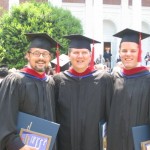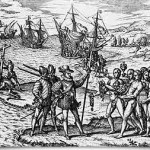Then Who Is Qualified?
Eric at “A Pilgrim’s Progress” continues discussing his transition from a more institutional, organizational church toward a more organic church. In his most recent post, “Experience and an M.Div. Do Not Mean I’m Qualified to Plant a Church,” he talks about the reaction that he’s received from several institutional type pastors.
Eric says:
There is one response I was not prepared for. When I’ve talked with some folks, usually pastors, they have given approval (not that I asked for it) to the idea of me planting and leading a church in my home. Please let me be clear: if a church starts, it will be God who plants it. I’m happy to be a part of it. Also, it is God who will lead it. Again, I’m just happy to be part of it.
It is the pastors I have talked with who assume that I will be both planting and leading it (several posts ago I spoke of me planting a church in my home; I regret the use of that language. The Holy Spirit is the real planter). They have approved for basically two reasons: A) I have experience as an institutional pastor, and B) I have an M.Div.
Eric concludes with this:
Experience and an M.Div. mean little as far as qualifications go. Planting a church needs one primary thing: complete joyful submission to the Lordship of Jesus Christ. It also needs a secondary thing: commitment to love others before self.
Eric’s post is very good. You should read all of it.
But, he brings up a very going point. Neither experience in a church nor an education make someone qualified to plant a church, to be an apostle, to be an elder, etc.
So, what does?
That Kind of Pastor
David Fitch from “Reclaiming the Mission” has written a thought-provoking post called “The Kinds of Pastors We Need and the Future of Evangelicalism in N America.”
In the post, David suggests that American churches are growing bigger (toward megachurches – he calls them “what is left of the Christendom populations”), disappearing (churches around 200), or birthed as/becoming small, missional communities. (He adds much more to this, but I want to jump to the next point.)
He then lists the characteristics of leaders these small, missional communities will need:
1.)BE RESOURCEFUL – OFTEN ABLE TO EARN THEIR OWN LIVING
2.) COMMUNAL SHEPHERDS – CULTIVATORS OF COMMUNITY IDENTITY IN MISSION
3.) INTERPRETIVE LEADERS -Â FUNDERS OFÂ IMAGINATION THRU SCRIPTURE FOR WHAT GOD IS DOING AMONG US AND AROUND US
4.) DIRECTORS OF SPIRITUAL FORMATION – SHAPERS OF PLACES THAT SHAPE OUR LIVES INTO CHRIST AND HIS MISSION
5.) LEADERS WHO GIVE AWAY POWER – DISPERSERS OF AUTHORITY AND LEADERSHIP INTO THE NIEGHBORHOODS
What do you think of David’s list? Do you think “that kind of pastor” would be helpful? What would you add to, remove from, or change about his list?
Talk is cheap. Blogging is even cheaper.
The title of this post is how Arthur at “The Voice of One Crying out in Suburbia” began his post “Time to get off the bench.” In the post, Arthur explains that he has decided to go to Haiti in January. He says:
After talking with my wife and the folks at the Haiti Orphan Project, I have decided to accompany their team to Haiti in January right around the anniversary of the devastating earthquake that left an already troubled nation utterly devastated. Time to get off the bench and get into Kingdom work… In speaking with my family, I see this as something that we as a family are looking at being involved in. Dave Black has said before that he regrets waiting so long to get into Kingdom work and I am taking his admonition to heart for me and for my family.
This is so exciting! I know that God will use Arthur to serve some orphans in Haiti, but I also know that God can use this trip to change Arthur and his family. I’m looking forward to what happens during and after Arthur’s trip.
By the way, I realize more and more that the more someone follows Christ, the more they will serve other people.
Day of Discovery
In honor of Columbus Day, Dave Black has listed a few “discoveries” that he’s made concerning evangelism (Monday, October 11, 2010 at 11:02 a.m.):
The particular method of evangelism doesn’t matter that much. Anything is better than the “no” method approach.
I need to ask God to burden my heart for people. It doesn’t happen naturally.
To influence the masses, you must reach individuals.
Persuasive people live sacrificial lives.
There are millions of lost sheep out there. I’m sent to find them. Not all of them, but some of them.
Every human soul is vulnerable to prayer.
A happily married person is a walking miracle.
Anticipate difficulty. Daily.
There is no favoritism with God. None!
I need to avoid professional weaker brothers and sisters in Christ. I will never conform to their lists, so why try?
Repeated demonstrations of concern and love build openings for the Gospel.
Don’t watch the clock. It may take years for someone to come to Christ.
If you have a conscience on some matter follow it, but don’t presume that your conviction is mandatory for everyone else.
Remain a citizen of heaven, but become a naturalized citizen of the world in order to reach it for Christ.
Travel light, as the Lord commanded. It is easy to carry too much excess baggage.
Can you bake a cake? Somebody might find Christ through just such a gesture.
Evangelism begins at home but can’t end there.
I love these, because they’re challenging. Just reading through the list, I was encouraged by some and admonsihed by others.
How about you? What do you think of this list?
Those Old People
Eric at “A Pilgrim’s Progress” has started a very interesting series “On Elders/Overseers/Pastors in the Bible.” The first post in his series is called “Elders in Acts 11:30.”
Here is the passage in question:
Now in these days prophets came down from Jerusalem to Antioch. And one of them named Agabus stood up and foretold by the Spirit that there would be a great famine over all the world (this took place in the days of Claudius). So the disciples determined, everyone according to his ability, to send relief to the brothers living in Judea. And they did so, sending it to the elders by the hand of Barnabas and Saul. (Acts 11:27-30 ESV)
Now, the term “elders” in that passage is a translation of the adjective Ï€ÏεσβÏτεÏος (presbuteros). As I said, this is actually an adjective (in the comparative form) that simply means “older.” In English, we have to supply a noun (which was not necessary in Greek). Since the adjective is masculine, we usually supply the noun “man,” although it could be generic. So, instead of being translated as “elder” (in the sense of a church “position”), the adjective could also be translated as “older man or older person.” Also, in this instance, the adjective is plural, so it could be translated as “older men or older people.”
Now, here is my question – which I asked Eric, and which is an honest question, because I haven’t decided myself yet: How do we know if Luke was writing about “elders” or if he was writing about “older men or older people”? Did Paul and Barnabas give the “relief” to specific people within the church in Jerusalem who had been recognized by the church as “elders”? Or did they give the relief to older men/people in the church in Jerusalem?
In fact, there are many passages in which this same question could be asked. Did James tell the sick person to summon the elders or older people? (James 5:14) Should the elders who lead well be considered worthy of double honor, or should the older people who lead well be considered worthy of double honor? (1 Timothy 5:17) Did Peter tell the elders how to care for the church or the older people? (1 Peter 5:1-3; note 1 Peter 5:5)
How do we decide which group of people each passage is referring to?
(By the way, Dave Black argues – convincingly, I think – that “older person” is someone who is older than 30.)
Which God?
Both David from “Spirit in the Wild Wood” and Arthur from “The Voice of One Crying Out in Suburbia” pointed us to a USA Today article called “Americans’ views of God shape attitudes on key issues.” According to the authors from Baylor University, Americans who believe in God describe God in one of four ways:
The Authoritative God. When conservatives Sarah Palin or Glenn Beck proclaim that America will lose God’s favor unless we get right with him, they’re rallying believers in what Froese and Bader call an Authoritative God, one engaged in history and meting out harsh punishment to those who do not follow him. About 28% of the nation shares this view, according to Baylor’s 2008 findings.
The Benevolent God. When President Obama says he is driven to live out his Christian faith in public service, or political satirist Stephen Colbert mentions God while testifying to Congress in favor of changing immigration laws, they’re speaking of what the Baylor researchers call a Benevolent God. This God is engaged in our world and loves and supports us in caring for others, a vision shared by 22% of Americans, according to Baylor’s findings.
The Critical God. The poor, the suffering and the exploited in this world often believe in a Critical God who keeps an eye on this world but delivers justice in the next, Bader says. Bader says this view of God — held by 21% of Americans — was reflected in a sermon at a working-class neighborhood church the researchers visited in Rifle, Colo., in 2008. Pastor Del Whittington’s theme at Open Door Church was ” ‘Wait until heaven, and accounts will be settled.’ ”
The Distant God. Though about 5% of Americans are atheists or agnostics, Baylor found that nearly one in four (24%) see a Distant God that booted up the universe, then left humanity alone. This doesn’t mean that such people have no religion. It’s the dominant view of Jews and other followers of world religions and philosophies such as Buddhism or Hinduism, the Baylor research finds.
I think its possible to see each of these views of God in Scripture.
Could it be that each of these “views” of God is partly right, but also partly wrong? Could it be that most people focus on only one aspect of who God is?
If so, what do you think determines which “view” of God someone takes? What can someone do to “broaden” their view of God (that is, to see more than a single perspective or aspect of who God is)?
Imagine all the people
Yes, today would have been John Lennon’s 70th birthday. But, this post has nothing to do with John Lennon (except the last two sentences).
Instead, this post is about Elroy from “Change Room” and his post “Imagine.” Elroy has been posting these short statements on Facebook. They all begin with “Imagine a community…” I’m glad he collected them all in one post. This is what Elroy says about his post:
I’ve been thinking lately about the values that were typical of the New Testament church. To me it’s much more exciting and important to champion these values than to highlight the mistakes of the modern-day church. Unfortunately when you emphasize biblical values, unbiblical values get mentioned by default.
Here are a few of my favorites:
Imagine a community where everybody thinks more highly of the next guy than of himself. Think church.
Imagine a community to whom relationships are more valuable than possessions. Think church.
Imagine a community where friends become as close and often closer than your natural family. Think church.
Imagine a community to whom sharing and giving is the new normal. Think church.
Imagine a community who defines success by the maturity of the group and not by the giftedness of individuals. Think church.
There are more in Elroy’s post. Go read them.
As an aside, Elroy is from South Africa, and a good friend of mine just announced that he is planning to move to South Africa (for a year or so) next Spring.
Hurtado on Christendom
Back in the day (about 5 years ago) when I was investigating various Ph.D. programs (actually considering potential Ph.D. mentors), I considered studying under Larry Hurtado… assuming he would accept me… and assuming that the University of Edinburgh would accept me as a student. I had read several of his books (and we exchanged a few emails) and I was greatly encouraged and challenged by him.
Not long ago, Hurtado began blogging, at “Larry Hurtado’s blog” no less. Last week, he published a few blog posts concerning his recent trip to China. In one of those posts (“Early Christian Negotiated Existence“), he wrote a little about his views of Christendom. This is what he wrote:
In the Western nations where Christendom once was dominant, it is dominant pretty much no more. I for one don’t grieve this one bit. I regard “Christendom†as a morally dubious phenomenon that probably did as much harm to the gospel as it ever did any good. It consisted more in the promotion of institutional power of churches and church officials. It may have had some effect in shaping professed public morals, and perhaps even some effect on moral practice. But I don’t like the idea of any religion being able to exercise social coercion, and I think that religious faiths should live or die solely by their ability to commend themselves to the consciences of people…
So, I find pre-Constantinian Christianity much, much more exciting than what comes later, with much more to say to churches, Christians, and non-Christians too in our modern era in which Christianity is essentially one religious option in a religiously plural world. If Christians want to figure out how to be authentic and particuarly Christian while also negotiating their contributions to the wider society, it’s Christians and texts from the first three centuries that provide the best resources.
I’ve come to very similar conclusions. So, while I’m glad that I made the choices of Ph.D. program and professor that I made, I think it would have been very interesting working with Hurtado.
Leading by Manipulating?
LT from “GraceWorks.ca” has written a very interesting article called “Manipulation in leadership.” LT tells several personal stories. For example:
I remember a conversation I had with a worship leader at a Pentecostal college. He told me how much control he had over a congregation just by the way he played. Everyone attributed it to the work of the Holy Spirit but he was quite bothered by how much he felt he could manipulate the crowd.
Here’s another one:
Another thing I learned in “pastoral theology” was how to project an image. The belief was that a Christian leader must always be looked up to in the eyes of the people. If you expose your weaknesses people will lose faith in you.
LT says these are all examples of manipulation. He contrasts this with what Paul wrote to the Thessalonians and Corinthians. He concludes with this:
Paul changed the western world one person at a time through love. I don’t think Christian leaders need to pretend or project. One can be open, honest, transparent and truthful and still lead. The catch is a lot of what Paul did is impossible if you are trying to influence hundreds of people at the same time.
So, is it possible to lead without manipulating? Is LT right that this is (nearly) impossible when dealing with a large group of people?
Discipling Lessons Learned
Stephen at “Chronological Bible Storying Journal – Rural Brazil” has written a very good post called “Lessons Learned: How to be a missionary.” Stephen shares some lessons that he’s learned while making disciples in Brazil.
Here are the major points:
Don’t spend your time trying to create groups.
Disciple groups that already exist.
Give preference to oral communication.
Don’t be a Bible scholar.
Be consistent and proactive.
Don’t celebrate decisions and move on.
Stephen explains each point in detail. So, jump over to his blog and read the whole thing.
What do you think of Stephen’s “lessons learned”?










